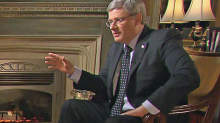

Peter Mansbridge had a tour de force interview with Prime Minister Stephen Harper, which aired on the CBC this week. (Full disclosure: He's a close and long-time friend.) For those looking at this interview as something of a pre-read for the next election, here are some undercurrents that struck me.
First, the PM's relaxed posture and frequent smiles are 2011's version of the blue cardigan. He comes off as increasingly comfortable in his own skin, more approachable, less a guy with something to prove or to hide. He's energetic in explaining his policy choices (actually much more so than his rival Michael Ignatieff), but avoids showing any peevishness or hyper-sensitivity to the fact that not everyone agrees with him.
He goes out of his way to characterize his government as one that is “centre-right” instead of choosing the “small-c conservative” label, which some might regard as nuance, but in reality broadens his audience from about 16 per cent to closer to 40 per cent or higher (when he talks about economic issues, which he did mostly). He cheerfully, even proudly, talks about how his government is made up of “political realists” not people who believe in some abstract view of political philosophy applied without regard for context. A question about the criticisms of him by the National Citizens Coalition president was a gift he might have stepped gingerly around in the past; this time he seized the opportunity to make the case, once more, that he is a mainstreamer. In a roundabout way, even when Mansbridge probed him on breaking his promises on the Senate, by acknowledging that “he did what he needed to do to get things done,” Harper signalled again that he is willing to be known as a pragmatist not an ideologue, a shape shifter more than a rigid firebrand.
On two bumper sticker social issues, abortion and capital punishment, Harper was adroit, looking to reassure his base and expand his reach. On abortion, he noted that he has supporters who are pro-life and he tells them they had best pursue their goals by trying to “change hearts not laws.” This articulation will be less discomfiting for urban and suburban women, a key audience for Harper and one for whom this issue is a litmus test. Then, on capital punishment, he warmed his base by stating that he personally favours the death penalty, even though he will not put the country through a debate about changing Canadian policy in this area.
On several occasions, he stresses that his actions are frequently guided by what Canadians want or don’t want. This populism, while understated compared to that of a Preston Manning, also seemed dialled up from his past “values, principles and convictions based” mantra.
Mansbridge got Harper to talk more about himself as a person than voters are accustomed to seeing. The PM's key moments seemed a bit polished, but overall more genuine than contrived. This willingness to open up will serve him well in an election campaign.
If there was one opportunity the Prime Minister missed, to my eyes anyway, it was on the discussion about the level of partisanship in Canadian politics. While Harper asserted again that he personally had become less partisan, and felt that the level of partisanship was maybe receding a bit, he also seemed curiously determined to challenge the idea that partisanship had become a serious problem in modern Canadian politics. He argued that a careful study of history would reveal that little had changed in terms of partisanship or the level of public esteem for politicians. I'll wager few voters were convinced, but in any event, is it a case worth trying to make? “It was always this bad” is not much of a talking point.
Mansbridge’s questions were well informed as usual, but the structure and flow of the interview was remarkable too: It moved smoothly through a discussion of the policy choices of the government, the management style of the PM, and Stephen Harper the person. The tone was genial but the different roles of journalist and subject were always apparent. There was neither contrived attack nor deliberate chumminess, but an interesting “adult conversation.” The kind most Canadians would likely welcome in their own kitchens or living rooms, if by some chance Stephen Harper were to knock on their door. Both the Prime Minister, and the public broadcaster, fared well in this exchange.
commentary by the Ottawa Mens Centre
Peter Mansbridge excelled himself as usual with a great interview that made
Harper reveal at least a little that he did not expect to.
If I'd been Mansbridge, I would have followed through with asking Harper his
thoughts
on how the death penalty should be carried out? Electric Chair, lethal injection
or firing squad?
Then I'd ask Harper about how he would deal with all those who were wrongfully
convicted and executed in the United States?
'Then I'd ask Harper about why Canadian Jails are increasingly filled not with
Criminals but fathers who went to court asking for an order for their child to
have a relationship with them and ended up before the underbelly of the
Judiciary, like Sheffield , Power and Robertson who put men in jail for no other
reason than to provide a mother with a reason why the kids can't have a daddy.
www.OttawaMensCentre.com